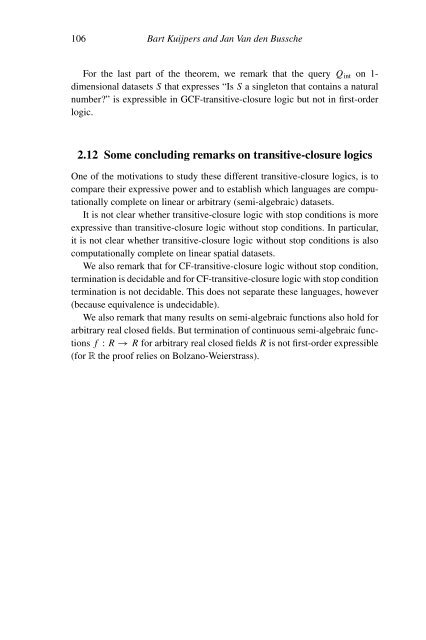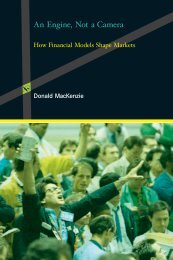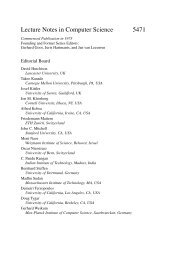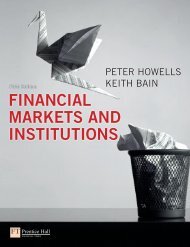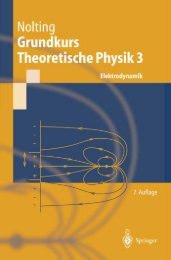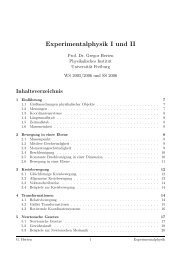- Page 2 and 3:
LONDON MATHEMATICAL SOCIETY LECTURE
- Page 4 and 5:
London Mathematical Society Lecture
- Page 6:
ContentsPrefaceJavier Esparza, Chri
- Page 9 and 10:
viiiPrefaceboth theoretically and i
- Page 11 and 12:
xPrefacea fixed value k such that o
- Page 14 and 15:
1Automata-based presentations ofinf
- Page 16 and 17:
Automata-based presentations of inf
- Page 19 and 20:
6 Vince Bárány, Erich Grädel and
- Page 21 and 22:
8 Vince Bárány, Erich Grädel and
- Page 23 and 24:
10 Vince Bárány, Erich Grädel an
- Page 25 and 26:
12 Vince Bárány, Erich Grädel an
- Page 27 and 28:
14 Vince Bárány, Erich Grädel an
- Page 29 and 30:
16 Vince Bárány, Erich Grädel an
- Page 31 and 32:
18 Vince Bárány, Erich Grädel an
- Page 33 and 34:
20 Vince Bárány, Erich Grädel an
- Page 35 and 36:
22 Vince Bárány, Erich Grädel an
- Page 37 and 38:
24 Vince Bárány, Erich Grädel an
- Page 39 and 40:
26 Vince Bárány, Erich Grädel an
- Page 41 and 42:
28 Vince Bárány, Erich Grädel an
- Page 43 and 44:
30 Vince Bárány, Erich Grädel an
- Page 45 and 46:
32 Vince Bárány, Erich Grädel an
- Page 47 and 48:
34 Vince Bárány, Erich Grädel an
- Page 49 and 50:
36 Vince Bárány, Erich Grädel an
- Page 51 and 52:
38 Vince Bárány, Erich Grädel an
- Page 53 and 54:
40 Vince Bárány, Erich Grädel an
- Page 55 and 56:
42 Vince Bárány, Erich Grädel an
- Page 57 and 58:
44 Vince Bárány, Erich Grädel an
- Page 59 and 60:
46 Vince Bárány, Erich Grädel an
- Page 61 and 62:
48 Vince Bárány, Erich Grädel an
- Page 63 and 64:
50 Vince Bárány, Erich Grädel an
- Page 65 and 66:
52 Vince Bárány, Erich Grädel an
- Page 67 and 68: 54 Vince Bárány, Erich Grädel an
- Page 69 and 70: 56 Vince Bárány, Erich Grädel an
- Page 71 and 72: 58 Vince Bárány, Erich Grädel an
- Page 73 and 74: 60 Vince Bárány, Erich Grädel an
- Page 75 and 76: 62 Vince Bárány, Erich Grädel an
- Page 77 and 78: 64 Vince Bárány, Erich Grädel an
- Page 79 and 80: 66 Vince Bárány, Erich Grädel an
- Page 81 and 82: 68 Vince Bárány, Erich Grädel an
- Page 83 and 84: 70 Vince Bárány, Erich Grädel an
- Page 85 and 86: 72 Vince Bárány, Erich Grädel an
- Page 87 and 88: 74 Vince Bárány, Erich Grädel an
- Page 89 and 90: 76 Vince Bárány, Erich Grädel an
- Page 91 and 92: 78 Bart Kuijpers and Jan Van den Bu
- Page 93 and 94: 80 Bart Kuijpers and Jan Van den Bu
- Page 95 and 96: 82 Bart Kuijpers and Jan Van den Bu
- Page 97 and 98: 84 Bart Kuijpers and Jan Van den Bu
- Page 99 and 100: 86 Bart Kuijpers and Jan Van den Bu
- Page 101 and 102: 88 Bart Kuijpers and Jan Van den Bu
- Page 103 and 104: 90 Bart Kuijpers and Jan Van den Bu
- Page 105 and 106: 92 Bart Kuijpers and Jan Van den Bu
- Page 107 and 108: 94 Bart Kuijpers and Jan Van den Bu
- Page 109 and 110: 96 Bart Kuijpers and Jan Van den Bu
- Page 111 and 112: 98 Bart Kuijpers and Jan Van den Bu
- Page 113 and 114: 100 Bart Kuijpers and Jan Van den B
- Page 115 and 116: 102 Bart Kuijpers and Jan Van den B
- Page 117: 104 Bart Kuijpers and Jan Van den B
- Page 121 and 122: 108 Bart Kuijpers and Jan Van den B
- Page 123 and 124: 110 Vera Koponenpebble game which d
- Page 125 and 126: 112 Vera KoponenDefinition 3.2.1 (i
- Page 127 and 128: 114 Vera KoponenFact 3.2.5 For any
- Page 129 and 130: 116 Vera KoponenAssumption 3.3.3For
- Page 131 and 132: 118 Vera KoponenLet π : ω 3 →
- Page 133 and 134: 120 Vera Koponen3.4 StabilityNow we
- Page 135 and 136: 122 Vera KoponenNext we state the c
- Page 137 and 138: 124 Vera Koponen3.5 Recursive bound
- Page 139 and 140: 126 Vera KoponenProof. Suppose that
- Page 141 and 142: 128 Vera Koponenor [32] for example
- Page 143 and 144: 130 Vera Koponenunder subformulas.
- Page 145 and 146: 132 Vera Koponeni
- Page 147 and 148: 134 Vera KoponenDefinition 3.7.4 We
- Page 149 and 150: 136 Vera KoponenTheorem 3.7.7 Suppo
- Page 151 and 152: References[1] J. Baldwin, Finite an
- Page 153 and 154: 4Definability in classes of finite
- Page 155 and 156: 142 Dugald Macpherson and Charles S
- Page 157 and 158: 144 Dugald Macpherson and Charles S
- Page 159 and 160: 146 Dugald Macpherson and Charles S
- Page 161 and 162: 148 Dugald Macpherson and Charles S
- Page 163 and 164: 150 Dugald Macpherson and Charles S
- Page 165 and 166: 152 Dugald Macpherson and Charles S
- Page 167 and 168: 154 Dugald Macpherson and Charles S
- Page 169 and 170:
156 Dugald Macpherson and Charles S
- Page 171 and 172:
158 Dugald Macpherson and Charles S
- Page 173 and 174:
160 Dugald Macpherson and Charles S
- Page 175 and 176:
162 Dugald Macpherson and Charles S
- Page 177 and 178:
164 Dugald Macpherson and Charles S
- Page 179 and 180:
166 Dugald Macpherson and Charles S
- Page 181 and 182:
168 Dugald Macpherson and Charles S
- Page 183 and 184:
170 Dugald Macpherson and Charles S
- Page 185 and 186:
172 Dugald Macpherson and Charles S
- Page 187 and 188:
References[1] G. Ahlbrandt, M. Zieg
- Page 189 and 190:
176 Dugald Macpherson and Charles S
- Page 191 and 192:
178 Stephan Kreutzeron any class of
- Page 193 and 194:
180 Stephan Kreutzerintroduction to
- Page 195 and 196:
182 Stephan Kreutzer• • • •
- Page 197 and 198:
184 Stephan KreutzerindependentsetW
- Page 199 and 200:
186 Stephan Kreutzerby definition,
- Page 201 and 202:
188 Stephan Kreutzernumber of free
- Page 203 and 204:
190 Stephan Kreutzer¬X i by x i =
- Page 205 and 206:
192 Stephan Kreutzerof the polynomi
- Page 207 and 208:
194 Stephan KreutzerIn this section
- Page 209 and 210:
196 Stephan Kreutzertree-decomposit
- Page 211 and 212:
198 Stephan Kreutzer(i) If e := {s,
- Page 213 and 214:
200 Stephan KreutzerDefinition 5.3.
- Page 215 and 216:
202 Stephan Kreutzerdepending on k.
- Page 217 and 218:
204 Stephan Kreutzerλ(t)It is easi
- Page 219 and 220:
206 Stephan Kreutzerbeing decompose
- Page 221 and 222:
208 Stephan KreutzerThis completes
- Page 223 and 224:
210 Stephan KreutzerIf there is suc
- Page 225 and 226:
212 Stephan Kreutzer1 23 456 7 8910
- Page 227 and 228:
214 Stephan KreutzerIt is easily se
- Page 229 and 230:
216 Stephan Kreutzerabstractbranchd
- Page 231 and 232:
218 Stephan Kreutzer3. A graph has
- Page 233 and 234:
220 Stephan KreutzerThe relevant ma
- Page 235 and 236:
222 Stephan KreutzerThe formula ϕ
- Page 237 and 238:
224 Stephan Kreutzerwith bounded tr
- Page 239 and 240:
226 Stephan KreutzerFigure 5.9 Imag
- Page 241 and 242:
228 Stephan Kreutzernecessarily hav
- Page 243 and 244:
230 Stephan KreutzerFigure 5.11 A w
- Page 245 and 246:
232 Stephan KreutzerFigure 5.14 Vor
- Page 247 and 248:
234 Stephan Kreutzerthe (at most 3)
- Page 249 and 250:
236 Stephan Kreutzerp-Rooted-MinorI
- Page 251 and 252:
238 Stephan Kreutzer13 213 24 114 1
- Page 253 and 254:
240 Stephan KreutzerobstructionO(C)
- Page 255 and 256:
242 Stephan KreutzerCorollary 5.5.1
- Page 257 and 258:
244 Stephan KreutzerWe start by sho
- Page 259 and 260:
246 Stephan Kreutzerall structures
- Page 261 and 262:
248 Stephan KreutzerFigure 5.17 Alg
- Page 263 and 264:
250 Stephan Kreutzerloc f (G, r)Def
- Page 265 and 266:
252 Stephan KreutzerNote that graph
- Page 267 and 268:
254 Stephan Kreutzeras they only co
- Page 269 and 270:
256 Stephan KreutzerL(λ, µ). The
- Page 271 and 272:
258 Stephan Kreutzerbecomes tractab
- Page 273 and 274:
260 Stephan Kreutzerwe must also be
- Page 275 and 276:
262 Stephan Kreutzerdefinition of t
- Page 277 and 278:
264 Stephan Kreutzereff. somew. den
- Page 279 and 280:
References[1] I. Adler, M. Grohe, a
- Page 281 and 282:
268 Stephan Kreutzer[32] F. Dorn, F
- Page 283 and 284:
270 Stephan Kreutzer[72] C. Papadim
- Page 285 and 286:
272 Martin Ottomodel theory as well
- Page 287 and 288:
274 Martin Ottocompleteness results
- Page 289 and 290:
276 Martin Ottoby the observable co
- Page 291 and 292:
278 Martin OttoHypergraphs, which a
- Page 293 and 294:
280 Martin Ottotranslation that ass
- Page 295 and 296:
282 Martin OttoIn a straightforward
- Page 297 and 298:
284 Martin OttoAs formula complexit
- Page 299 and 300:
286 Martin OttoA ′ are clear from
- Page 301 and 302:
288 Martin Ottocan choose his chall
- Page 303 and 304:
290 Martin OttoIn the more interest
- Page 305 and 306:
292 Martin OttoA 0 |= ϕ[a]. By inv
- Page 307 and 308:
294 Martin Ottoimplications see [23
- Page 309 and 310:
296 Martin Ottoguarded subsets and
- Page 311 and 312:
298 Martin OttoIt is clear that the
- Page 313 and 314:
300 Martin Ottoglobal bisimulation
- Page 315 and 316:
302 Martin Ottoa fragment associate
- Page 317 and 318:
304 Martin OttoFor Gaifman’s theo
- Page 319 and 320:
306 Martin OttoIf n 0
- Page 321 and 322:
308 Martin OttoObservation 6.3.2 Fo
- Page 323 and 324:
310 Martin OttoLocally acyclic bisi
- Page 325 and 326:
312 Martin OttoThis follows from th
- Page 327 and 328:
314 Martin Ottocases also provide a
- Page 329 and 330:
316 Martin Ottocharacterisations of
- Page 331 and 332:
318 Martin Ottotarget node â n in
- Page 333 and 334:
320 Martin OttoAmong the long open
- Page 335 and 336:
322 Martin Ottoby a hypergraph ˆ H
- Page 337 and 338:
324 Martin Ottosize 3. We return to
- Page 339 and 340:
326 Martin Ottocondition (ii) rules
- Page 341 and 342:
328 Martin Ottostructures of bounde
- Page 343 and 344:
330 Martin OttoFO data and combined
- Page 345 and 346:
332 Martin OttoThese are proved cla
- Page 347 and 348:
334 Martin Ottominimal if their ric
- Page 349 and 350:
336 Martin Ottomeaning that every s
- Page 351 and 352:
338 Martin Ottodevelopment and rami
- Page 353 and 354:
340 Martin Otto[14] Dawar, A., and


